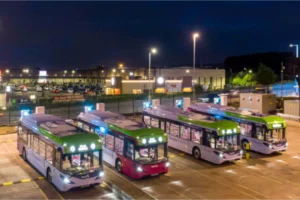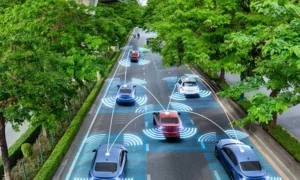Fundamental changes in the way we live and behave need to be addresses if reducing air quality is to be successful, according to Carla Stockton-Jones, the new Managing Director of Stagecoach.
“The biggest way we can address air quality and climate change is not by just replacing one technology for another. It’s by fundamental changes in the way we live and behave,” she said. ““As Covid-19 continues to impact the health and wellbeing of our country and our economy, attention is rightly focusing on how we can avoid a further terrible toll from a virus that has already seen the loss of close to 60,000 people in the UK. It is a terrible human cost and one that is made even worse by huge job losses and many hidden health impacts. We need government to work with public transport operators to promote public transport as a safe and positive choice and encourage Britain back on board the country’s buses.”
Ms Stockton-Jones added: “It should also be a wake-up call on an issue that studies have suggested is a contributory factor in many Covid-19 deaths: the dirty air we breathe in towns and cities across the UK. Air pollution is the biggest environmental health risk we face today. It’s responsible for heart and lung diseases, impacts the development of our children, and has also been linked to mental health issues.
“Yet, as we mark Clean Air Day today, the contrast in the response to this air quality crisis and the speed of steps to tackle Covid-19 is startling. Air pollution causes up to 36,000 deaths in the UK – every year. Much of this is caused by the travel choices we make. Diesel cars are the single biggest contributor to NOx levels, responsible for 41% of all NOx emissions from road transport. However, there has been a lack of urgency in measures to tackle the problem, with Clean Air Zone plans often wrongly targeting buses and a continued reluctance to face up to measures needed to tackle single use car trips. We can no longer just talk about future strategies; the time for action is now.”
Over the past decade, Stagecoach has invested £1 billion in 7,000 new greener vehicles and technologies in the past decade – more than any other bus operator in the UK, according to Ms Stockton-Jones.
“We’ve trialled new biofuels, invested in hybrid electric vehicles, and operated hydrogen-powered buses. Earlier this year, we introduced a whole new fleet of double decker electric buses in Manchester, one of the biggest single investments in e-buses anywhere in Europe. And we are planning the launch of 34 new greener coaches onto our Oxford Tube services linking London, with several fitted with solar panels to reduce fuel consumption,” she said.
According to her, the UK has the cleanest ever bus fleet and one bus can take up to 75 cars off the road. Britain’s buses also deliver huge wider community benefits. Every year, Stagecoach alone is estimated to save the UK over £12m in emission costs, more than £13m in healthcare bills, £44m through safer roads, and close to £350m in potential congestion-related savings from a reduction of 1.22 billion miles of traffic.
According to the Centre for Research and Clean Air, the drastic reduction in car use seen in April as a result of measures to tackle Covid-19 has likely saved 1,700 lives due to improved air quality.
“This shows that where there is the will to act differently, we can make a huge difference. Our country’s dirty air is as big a threat to our health as Covid-19. We need to bring the same sense of urgency and ambition as we’ve seen in the nation pulling together during the pandemic. We can no longer just talk about future strategies; the time for action is now.”





















